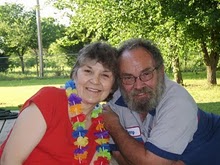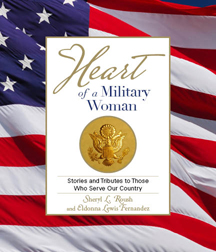Military Story: “Dead Air” by Shirley Sisko Harkins
Cats: Heart of a Military Woman, Stories|
by Shirley Sisko Harkins
When I enlisted in 1976, the Women’s Army Corp (WAC) was in the process of being disestablished as a separate branch of the Army. I’m very proud to have been one of the last WAC’s, serving during this exciting era in military history. Women were being admitted to West Point. Maternity leaves replaced compulsory discharges, and the umbrella, a traditional military taboo was approved for issue in the name of promoting a positive feminine image. The powers that be even retained a designer to fashion a sporty new mint green, wash and wear uniform. The times they were a changin’.
There were those, of course, who weren’t enthusiastic about the trend. I encountered several male soldiers who appeared to be threatened by the growing presence of women in the motor pool, the mess hall, and even in co-ed barracks. Some men attempted to deflate our influence with casual flirtation. Others insisted we carry our weight—equal pay for equal work, by golly. None, however, stood out so predominantly in my memories as a certain surly NCO at Fort Gordon, Georgia.
Even though I’d have to change it here to protect the innocent, I wish I recalled his name. He was a gristly, Old Army type—a field instructor attached to the signal school where I was trained. I was offered only three occupational options; food service, clerkship, or communications. I’d opted be a radio teletype operator—a dinosaur Military Occupational Specialty (MOS), like the WACS that no longer exists. Quaint historical reference makes for great story telling. Ask any veteran, young or old. When two or more gather together, the war stories commence in earnest.
The Old Army NCO taught in the field, training the students to apply classroom academics to the actual equipment we’d use to perform our duties. We knew the basics of setting up and maintaining a radio network, but hadn’t learned a great deal about trouble-shooting. His job was to station himself with one network station each day and teach us how to deal with real life obstacles as they cropped up.
His approach was stoic—stand back and let us flounder, making one frantic mistake after another, until the entire network crashed. Afterwards, he’d explain what went wrong and help us to figure out how we could have responded more effectively. In theory, his methods seemed valid enough, but his criticism was often sarcastic and condescending. Locking us in a poker face look, he’d observe every move without offering the slightest hint as to whether we were right or wrong. We never knew what was coming; reward or reprimand. It was excruciating.
One morning, I was manning the network controlling station. By the time he stuck his head through the door of the rig where I was working, I’d already lost communication with one of my network stations. The others were apparently beginning to panic, thumbing through their ciphering and frequency manuals to determine if their settings were correct. Lack of confidence in their own training may have caused them to fiddle with the dials.
The gristly NCO watched while I performed a network check, hailing the other two stations and getting dead air in response. I feverishly typed in the abbreviated commands again and got nothing. Staring at the teletype for a few seconds, I prayed for inspiration. He was expecting me to do something, so I hopped out of the rig and headed toward a nearby jeep.
I slipped on the Morse code key leg strap and began tapping out the commands. The NCO followed. He rested an elbow on the crash pad, leaning in toward me. He didn’t say a word. When the keypad failed, I sat for awhile staring at the field phone, knowing that any transmission on it would be unsecured. I glanced at the NCO, but received no encouragement either way.
I decided to go for broke, snatching up the handset and cranking the generator. He was going to chew me up and spit me out no matter what I did, so I had nothing to lose. Via landline, I was able to contact each network station. Careful not to reveal any classified information over the airways, I instructed them to consult their manuals so we were all on the same page.
Afterwards, I jumped back in the rig and ran the network test again. Oh, to hear the glorious beeps, clicks, and whirs of life. We operated the rest of that day without incident. The NCO never uttered a word. Later that day, back in the barracks, I was summoned to the pay phone in the foyer. I greeted the caller, hearing tinny juke box music, tinkling glassware, and raucous voices in the background. Because he spoke so few times, I didn’t recognize the NCO’s gravelly voice until he introduced himself.
The hair rose on the back of my neck. I must have really messed up if he was calling from the NCO Club to tell me so. Judging by the way he slurred his words, the lecture probably wasn’t going to be polite.
When I didn’t respond, he continued. “I hate women,” he said. “I especially hate women in the Army, so it really hurts to have to tell you this.” He paused for what sounded like another slug from his cocktail.
“But you did one heck of a job out there this morning getting that network back up and running.” Of course, being Old School, he didn’t say “heck,” but I took the liberty to paraphrase.
When I caught my breath after the initial shock, I thanked him. He promised that if I ever told anyone about our conversation, one-sided as it was, that he would promptly deny it. With that, he hung up, and I was left listening to dead air again.
I would go on to receive promotions and other honors from the United States Army, but none gratified me as much as a phone call from a gristly Old School NCO with a chip on his shoulder for women.
~Shirley (Sisko) Harkins
www.dramadrash.org
©2009
 "I am a believer of thirteen years and spent much of that time absorbed in scripture study and research. I also hold a Masters Degree in Biblical Study and Theology. My ministry extends to my homelife as a wife and mother. My children are grown and I’m very proud of the godly young adults they’ve become, despite being raised in the church only half of their lives. I am priviledged to serve the Father as Artistic Director of Drama Drash Ministries."
"I am a believer of thirteen years and spent much of that time absorbed in scripture study and research. I also hold a Masters Degree in Biblical Study and Theology. My ministry extends to my homelife as a wife and mother. My children are grown and I’m very proud of the godly young adults they’ve become, despite being raised in the church only half of their lives. I am priviledged to serve the Father as Artistic Director of Drama Drash Ministries."PHOTO: Shown here with husband Danny.
 "Dead Air" is published in the Heart of a Military Woman book by Sheryl L. Roush and Eldonna Lewis Fernandez
"Dead Air" is published in the Heart of a Military Woman book by Sheryl L. Roush and Eldonna Lewis Fernandez
Chapter: A Day in the Life
Book released Veterans Day 2009.
Posted here with permission from Authors.
Contact: Sheryl@HeartBookSeries.com for permission to reprint. It will be granted.
Shirley Harkins lost her battle with cancer on December 28, 2009. She did, however, get to see this story in print shortly prior to her passing. Upon receiving acknowledgement that Dead Air would be published, she write this note to the publisher:
Dear Ms. Roush,
I am so delighted to be included on this book. My time in the military was among my prouded.
Warm Regards,
Shirley Harkins
Beloved wife, mother and grandmother, she went to her well-deserved place in Heaven as a Daughter of Israel on Monday, December 28, 2009 after a long courageous battle with cancer. Burial with military honors on January 1, 2010 in the Fort Sill National Cemetery, Elgin.
Shirley was a shining star. Much beloved, greatly admired and well respected by all who knew her. She was a woman of constant positive outlook, great self-determination that enabled her to accomplish any goal she set for herself, great personal strength that she readily shared with all who needed her, and great kindness to all. Shirley loved the Lord with all she was and was a model of great fortitude. She never wavered in her faith and commitment to her path of truth and light.
Shirley Sisko Harkins graduated from Luther L. Wright High School in Michigan, spending her senior year as a foreign exchange student in Brasilia, Brazil, where she became fluent in Portuguese. She then attended Michigan State University in Lansing, Michigan. She was a veteran of the US Army, serving honorably as a member of the Women’s Army Corp (WAC) with the US Army Signal Corps in Bad Kreuznach, Germany from 1976 until 1978.
She married Daniel Harkins, earned her Master’s degree in Business at Cameron University in Lawton, then earned a Master’s degree in Divinity and became an ordained minister, as well as Director of the Drama Drash Ministries of Lawton, Oklahoma.
I discovered that peace doesn’t mean the end to conflict;
it simply demonstrates the love of God.
And we don’t have to wait for a major crisis in our lives;
we can allow the peace of Christ to rule our hearts each day.
Richard Parker, Upper Room Daily Devotional
VIEW OTHER BOOKS –AND MUSIC IN THIS SERIES:
Click on title to view each book.
Heart of a Woman (printed)
Heart of a Military Woman (printed) ….. and on Kindle
Heart of a Mother (printed)
Heart of a Mother (printed with Bonus Music CD)
Heart of a Mother … Music CD
Heart of the Holidays (printed) ….. and on Kindle
Heart of the Holidays … Music CD
Heart of a Woman in Business (printed)
Corazon de Mujer (printed) (Heart of a Woman in Spanish)
